|
Legal aid Commission
Child Protection Society of Ceylon - 82nd
anniversary:
Juvenile justice system in Sri Lanka
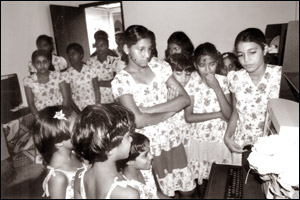
Computer Centre run by the Child Protection Society at
Rukmalgama |
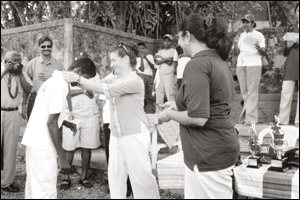
Australian High Commissioner Kathy Klugman presenting an
award at a cricket match |
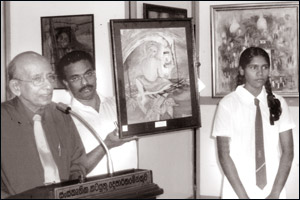
A winner of a Child Protection Society Art Exhibition |
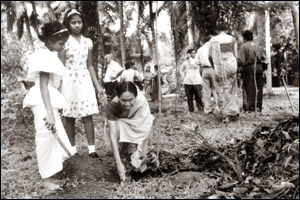
Tree Planting at CPS, Rukmalgama |
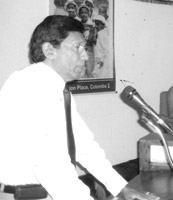
Ranjith Wijewardene Addressing the 81st AGM |
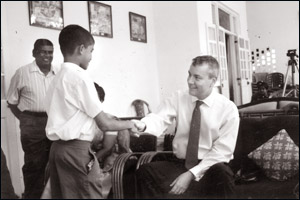
British High Commissioner Dr Peter Hayes during a visit to
the Child Protection Society |
Sri Lanka 's juvenile justice system is one of world's earliest and
Asia's first. The British colonial Government gave patronage to the
Child Protection Society formed in 1928 by British philanthropist Sir
John Pansons.
The British Parliament in a series of reports in early 1930
recognized the valuable child protection service rendered by the Child
Protection Society under the Governor's patronage creating child rights
awareness in the island and maintaining two Children's Homes for boys
and Girls observing the latest child protection principles. This is over
20 years before the United Nations even took the minimal steps to
establish an agency to protect child rights, UNICEF.
Sri Lanka is also the first Asian colony to enact a comprehensive
Child Protection Ordinance in 1938. This Law is still the Magna Cartar
of child protection in Sri Lanka even after 72 years. The subsequent
child protection legislation - i.e. the Adoption Ordinance or late
subscription to United Nations sponsored child right convention while
influencing protected status of child have not comparatively contributed
to enable the continuing need for child protection.
Magistrate's Courts are entrusted with the protection of children and
dealing with issues of juvenile justice. All Magistrate's Courts in the
country have jurisdiction to deal with juvenile cases. The Magistrate's
Court at Bambalapitiya now re-located in Battaramulla in a spacious
building is still the only court which is exclusively devoted to
dispense protective and corrective justice. The structure of only
Juvenile Court in Colombo is child friendly with play rooms, child
courtesy centers. I was informed during a recent visit that video
evidence facilities which is an integral part of modern juvenile justice
in many enlightened countries will be soon installed. Video evidence
protect vulnerable children from formal inquiry atmosphere had been very
successfully adopted in the Philippines Juvenile Courts.
The Government Institutions devoted to child protection which appear
to have received new leadership should be further supported by way of
training and resources. Soon after a cruel longstanding internal war
where the children were the frontline victims, child rehabilitation and
protection should seek both national and international cooperation far
above the present levels.
SS Wijeratne
The Child Protection Society which celebrates its 82nd anniversary
has conducted many programs for the welfare of children. Countrywide
projects such as tree planting campaigns have been
conducted over the years
Objectives of Child Protection Society
(1) To prevent cruelty to Children.
(2) To prevent neglect of Children.
(3) To prevent the exploitation of Child Labour.
(4) To rescue Children from immoral surroundings and to shield them
from immoral contamination.
(5) To Secure Suitable new guardians for Children who have been
deprived of their natural guardians or who should be removed from them
in the interest of humanity.
(6) To stimulate public opinion and to make the community
increasingly sensitive to forms of abuse that exist, but of which the
evil results are not fully appreciated.
(7) To assist in the enforcement of the laws affecting Children.
(8) To secure fair and equitable administration of justice as regards
the rights of Children and enforcement of the laws affecting them.
(9) To watch all projected legislation in any way bearing on the
interests of Children and to secure as far as practicable that the
principles involved therein shall be fair and equitable alike to
Children and the Public.
(10) To point out to Government any deficiencies in the existing
legislation affecting Children, which may come to the notice of the
Society.
Juvenile justice legislation and orphan care
This segment of the report deals with some of the principal
enactments for the protection of children without parental care. More
specifically it focuses on : Children and Young Persons Ordinance,
Orphanages Ordinance and Penal Code provisions.
Juvenile Justice
Juvenile Justice is the law that states how a Court should deal with
children when they appear before it, whether as an offender or as a
victim of crime. Juvenile Justice is administered through Juvenile
Courts. If a Juvenile Court is not available, a Magistrates' Court will
function as a Juvenile Court when children appear before it. Any child
who is in need of care or protection can be taken before a Magistrate
sitting as a Juvenile Court Judge to decide on the steps to be taken to
ensure that the child is cared for or protected, the different
enactments dealing with juvenile justice are presented in the sequel.
Children and Young Persons Ordinance 1939 (as amended)
The main objectives of the Ordinance as stated in the preamble are
the establishment of Juvenile Courts supervision of juvenile offenders,
protection of children and young persons and realization of other
related purposes. In all contexts, the Court will give primary
consideration to the welfare of the child.
According to the Ordinance, a child or young person is considered to
be in need of care and protection if he or she is found in the following
circumstances.
(a) The child or young person has no parent or guardian ; or has a
parent/guardian who is unfit to exercise care and guardianship; or the
child/ young person is not receiving proper parental/ guardian care;or
the child /young person is either falling into bad association or
exposed to moral danger , or beyond control.
(b) The child or young person who:
(1) being a person against whom any of the offenses mentioned in the
First Schedule to the Ordinance has been committed or
(2) being a member of the same household as a child or young person
against whom such an offence has been committed; or
(3) being a member of the same household as a person who has been
convicted of such an offence in respect of a child or young person; or
(4) being a female member of a household whereof a member has
committed an offence under section 17 of the Marriage Registration
Ordinance against another female member of that household.
(c) The child is one against whom an offence has been committed under
section 77 of the Children and Young Persons Ordinance.
Court Proceedings
Any officer of a local authority or any police officer or authorized
person having reasonable grounds for believing that a child or young
person is in need of care or protection may bring him/her before a
Magistrate's Court sitting as a Juvenile Court.
The Court May
(a) order the child to be sent to an approved or certified school if
the child has attained the age of 12 years , or
(b) commit him/her to the care of a fit person who is willing to
undertake the care of him/her (An order made placing a child under the
care of a fit person remains in force until the child becomes 16 years
of age); or
(c) bind the child's parent or guardian to a legal obligation to
exercise proper care or guardianship; or
(d) make an order placing the child under the supervision of a
probation officer or some other person appointed for the purpose by the
Court for a period not exceeding three years.
Supervisory duties of probation officers and fit persons
If the Court places the child or young person under the supervision
by either
a probation officer or a fit person, the probation officer/fit person
must:
(a) visit the child/young person or get reports from him or her at
regular intervals;
(b) ascertain whether the conditions of the Court order are being
observed;
(c) report to the Court on the child's/young person's behaviour;
(d) advise and assist the child/young person and when necessary find
him a suitable Job;
(e) if it appears to be in the interest of the child or young person,
the probation officer may bring him before a Magistrate's Court sitting
as Juvenile Court which may, if it thinks that it is desirable in the
interests of the child/young person, order him to be sent to an approved
or certified school or commit him to the care of a fit person.
Questions related to children
Page compiled by Kalani A medagoda, AAL
Question: How do we establish Law Circles in our school?
Student, Balangoda
Answer: You have to first get together and form a society in
your school. Thereafter you have to send a letter to the School Program
Desk, Legal Aid Commission requesting for a Law Circle to be formed in
your school. On receipt of your letter, one of our Legal Aid lawyers
will guide you to form a law circle in your school. The main objective
of forming law circles in schools is to create awareness among the
school children regarding day to day law including humanitarian laws,
such as Elders' Law, Consumer Protection Law, Disabled Law, Domestic
Violence Law, etc. The address is given below.
Children's Desk, Legal Aid Commission, No. 129, High court complex,
Colombo 12.
Question: What are the worst forms of child labour prohibited
in Sri Lanka?
Chamara, Mahara
Answer: The Penal Code No.2 of 1883 (the Penal Code) and its
amendments deals with the worst forms of child labour in Sri Lanka.
The following types of worst forms of child labour are prohibited in
Sri Lanka:
* Employing a child to appear or perform in any obscene or indecent
exhibition or show, photograph or film;
* Causing or procuring a child to beg;
* Hiring or employing children to traffic in restricted articles;
* Sexual exploitation of children;
* Debt bondage;
* Serfdom;
* Forced or compulsory labour;
* Slavery ; and
* Engaging or recruiting a child for use in armed conflict.
Question: What is child trafficking?
Nimalka, Kalutara
Answer: Child trafficking is prohibited under the Penal Code
in Sri Lanka.
Child trafficking means:
* Any act of buying, selling, or bartering of a child for money or
any other consideration;
* Arranging for or assisting a child to travel to a foreign country
without the consent of his or her parents or lawful guardians;
* Obtaining the signed consent (i.e.affidavit) from a pregnant woman
for money or any other consideration for the adoption of the unborn
child of such woman;
* Engaging in procuring a child from hospitals, clinics, day care
centres, nurseries, shelters for women, welfare centers or any other
child care institutions for money or any other consideration: and/or
* Getting a child from any such institution or centre by intimidation
of the mother of the child or the lawful guardian or the person in
charge of such institution or centre.
Question: Please let me know whether it is an offence to
publish the name of the child who is a victim in relation to rape or
sexual harassment cases?
Chamika, Kalutara
Answer: Yes, under the Penal Code it is an offence to publish
any matters relating to sexual harassment (Sec. 345), procuration (360A)
sexual exploitation on children(360B), rape (363),Incest (364A),
unnatural offences (365A) and grave sexual abuse (365B)
Under the Penal Code Section 365(c) state that whoever prints or
publishes, the name or any other matter which may make know the identity
of any person against whom an offence under Section 345 or Section 360 A
or Section 360 B or Section 363 or Section 364A or Section 365 or
section 365A or Section 365 B is alleged or found to have been committed
(hereinafter in this Section referred to as "the victim shall be
punished with imprisonment of either description for a term which may
extend to two years or with fine or with both.
(2) Nothing in subsection (1) shall apply to the printing or
publication of the name, or any matter which may make known the
identity, of the victim, if such printing or publication is
(a) by or under the order of the officer-in-charge of the police
station or the police officer, making investigation into such offence,
acting in good faith for the purpose of such investigation or
(b) by or with the authorization in writing of the victim; or
(c) by or with the authorization in writing of the next of kin of the
victim where the victim is dead or parent or the guardian of the victim
, where the victim is a minor or is of unsound mind;
Provided no such authorization shall be given by such next of kin to
any person other than to the Chairman, Secretary or Manager, how to ever
described, of any welfare institution or organization recognized by the
state.
(3) Whoever prints or publishes any matter relation to any
proceedings in any court with respect to an offence referred to in
subsection(1), without the previous permission of such court, shall be
punished with imprisonment of either description for a term which may
extend to two years or with fine or with both. But the printing of a
judgment of the Court of Appeal of the Supreme Court does not amount to
an offence within the meaning of this section.
Question: Kindly let me know how we could register for the
Samaka Diriya Pension Scheme for children with disabilities.
Chanuka, Kandy
Answer: You have to write a letter to the Director, Sri Lanka
Social Security Board, LHP Building, 1st Floor, Nawala Road, Nugegoda
attaching thereto a photocopy of the Birth Certificate/Identity Card of
the disabled child.
For any further assistance you can visit the Legal Aid Commission,
Disabled Unit at No. 129, Hulftsdorp Street, High Court Complex, Colombo
12.
Question: Please inform me how to alter my eldest son's
surname and his father's details in the Birth Certificate according to
my second marriage husband's details.
Ridma, Katugastota
Answer: The father's details in your child's Birth Certificate
cannot be altered. Only the child's surname inherited from the first
father can be substituted with the surname of the second father in cage
13 under Sec. 27A.
Please contact the Registrar of the Birth/Deaths at the Divisional
Secretariat Office where your child's Birth Certificate is registered.
If you need further advice you can contact
Legal Aid Commission No129, High Court Complex Colombo 12. |



